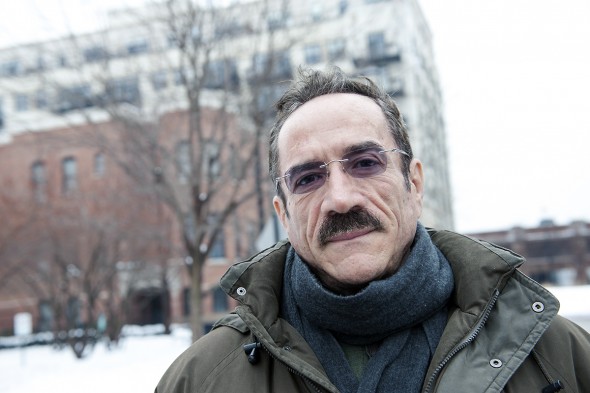Tracking the changes in urban neighborhoods

John Betancur, associate professor of urban planning and policy, studies gentrification. Photo: Roberta Dupuis-Devlin/UIC Photo Services
When gentrification occurs, drawing higher-income people into a neighborhood, some who live there are forced out by the newcomers.
“I take the side of those who are displaced,” said John Betancur.
“We all have the right to a city,” said Betancur, associate professor of urban planning and policy. “And poor minorities may need the city more than the wealthy.”
Betancur does his research in Chicago neighborhoods like Wicker Park, Lakeview, Lincoln Park, Humboldt Park, Pilsen, Uptown, Logan Square and Bronzeville.
“I study urban change,” he said. “Gentrification is a big element of that. So is ghettoization, the intensification of poverty concentration.”
In addition to researching neighborhood change, Betancur is co-founder of two nonprofit community groups, and for 15 years has provided technical assistance to other such organizations.
“All these groups want to know how to stop gentrification,” he said.
“It’s forcing communities out, disturbing the support systems they created, and threatening many of their causes.”
People who have to move have to reconcentrate and regain their strength, Betancur said.
“The new people have cars and money to pay taxes,” he said. “The people they displace are much more limited in their mobility.”
As for the groups that worked with those residents, they must either move with them or “refocus” to serve people moving in, he said.
Gentrification “gives a second chance to cities by increasing their tax base,” Betancur said. “And developers and speculators make a lot of money — they buy cheap and sell very dear.”
The poor have always been with us, he noted.
“But before, they had entry-level manufacturing jobs with no education needed,” he said.
“Now you need education for any job. And a lot of jobs are being shipped overseas — even middle-class jobs to India and Singapore.
“So many people are falling between the cracks — they end up concentrated in super-ghettos.”
In a study of Englewood residents, “I found out how society gives up on them, makes them disposable,” Betancur said.
According to the stereotype, the neighborhood is heavily criminal. Because of their criminal records, many residents cannot vote or rent an apartment, he said.
“Englewood is overpoliced, investing more in policing than in giving them opportunities,” Betancur said.
Contrary to popular belief, the neighborhood has educated as well as uneducated residents, he added.
Betancur also studies race, including black-Latino relations.
“Discrimination is illegal, and many think because of that, that it’s over,” he said.
But it’s not, and poor blacks and Latinos often target each other, he said.
“The media tend to stir up one against the other.”
Betancur, a native of Colombia, has personal experience in this area.
“I’m Latino, and race has excluded me, but the fact that I’m a professor allows me to mitigate that,” he said.
Growing up “white” in Latin America, “I never had to think about race,” he said.
“The fact that I was white meant I was on the side of the winners. But when I immigrated here, I became brown.
“In professional life, that can be a killer. You’re overlooked often when they’re looking for someone to promote.”
On the street, Betancur found that police were suspicious of him when they realized he was Latino. When he was living in white neighborhoods on the North Side, “I was made aware by my neighbors that I was Latino,” he said.
Now he lives in Washington Heights, where he’s the only white on an otherwise all-black block.
“Some people stare at me as if they were wondering,” Betancur said. “The immediate area I live in is middle-class but is surrounded by low-income neighborhoods classified as high-risk.
“I am learning the ropes and letting it come to me — rather than being prejudicial or avoiding people.”
Betancur, who joined the UIC faculty in 1979, earned a bachelor’s degree at Universidad Pontificia Bolivariana in Medellin, Colombia, an advanced degree in sociology at Universidad de San Buenaventura in Medellin, and a master’s and Ph.D. at UIC.
He is co-editor of two books, Collaborative City, about black-Latino relations, with Douglas Gills, a retired professor of urban planning, and Reinventing Race, Reinventing Racism, on race relations since the Kerner Commission report in the late ’60s, with Cedric Herring, professor of sociology.
Betancur is doing research for a book on neighborhood change with Janet Smith, associate professor of urban planning and policy and co-director of the Voorhees Center for Neighborhood and Community Improvement.
“My research is always tied to my commitments and to who I am,” Betancur said.
“The university, too, has a responsibility to society.”
Categories
Topics
Chicago, cities, gentrification, housing, neighborhoods, race, urban, urban planning
